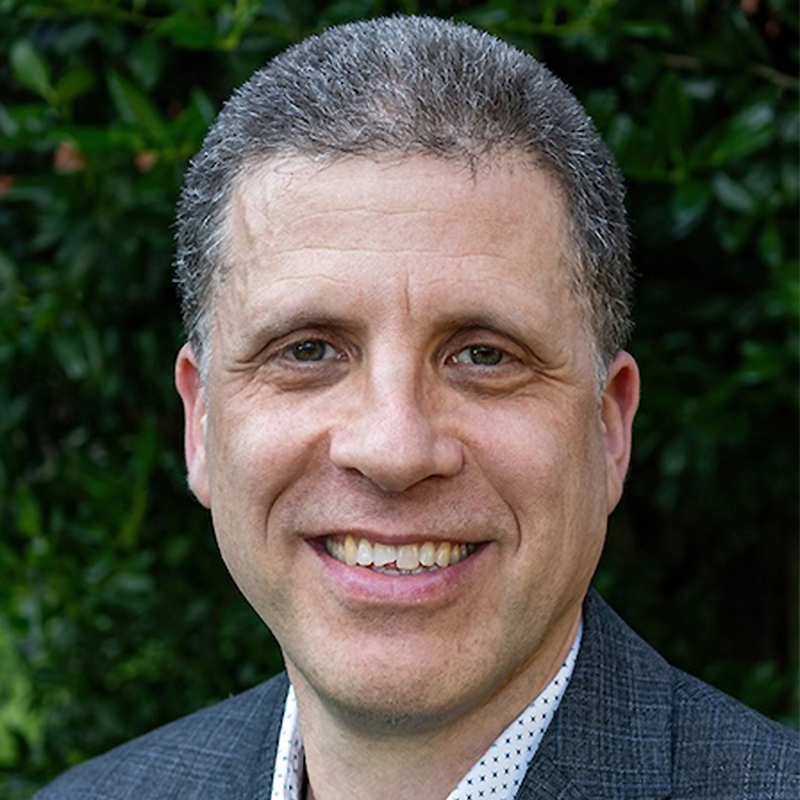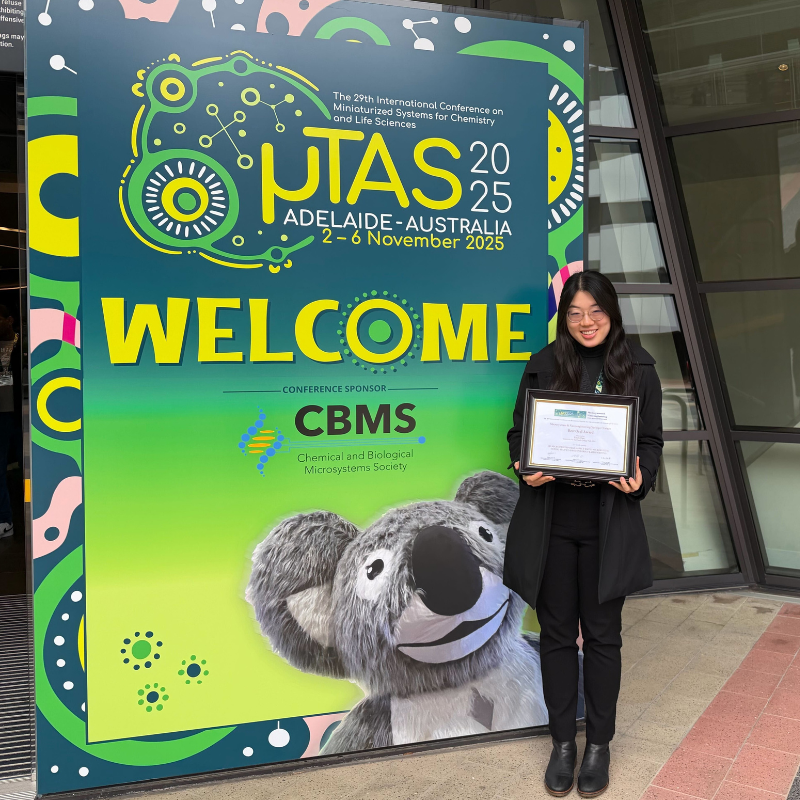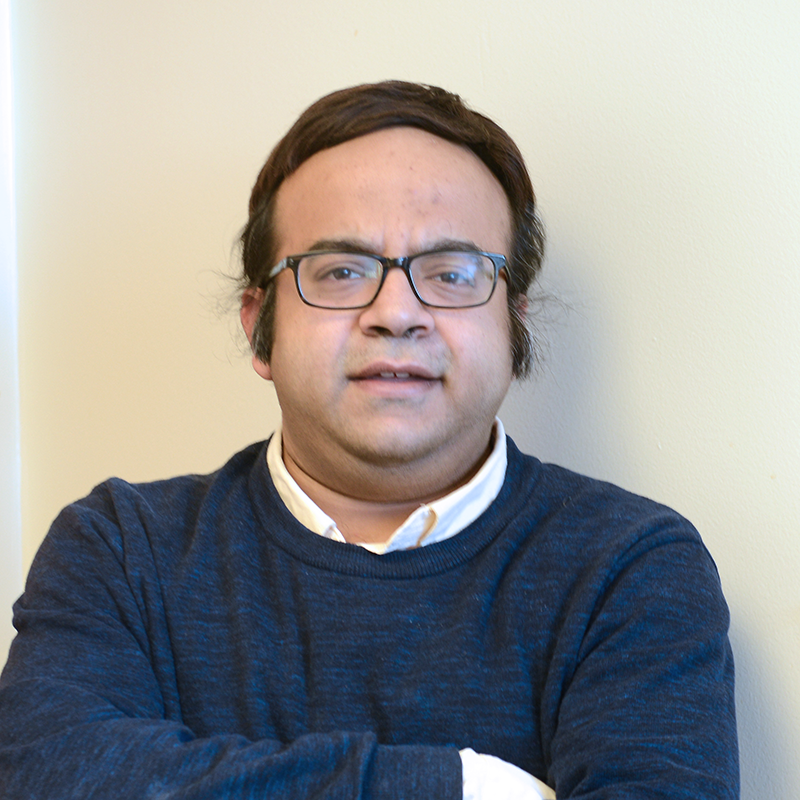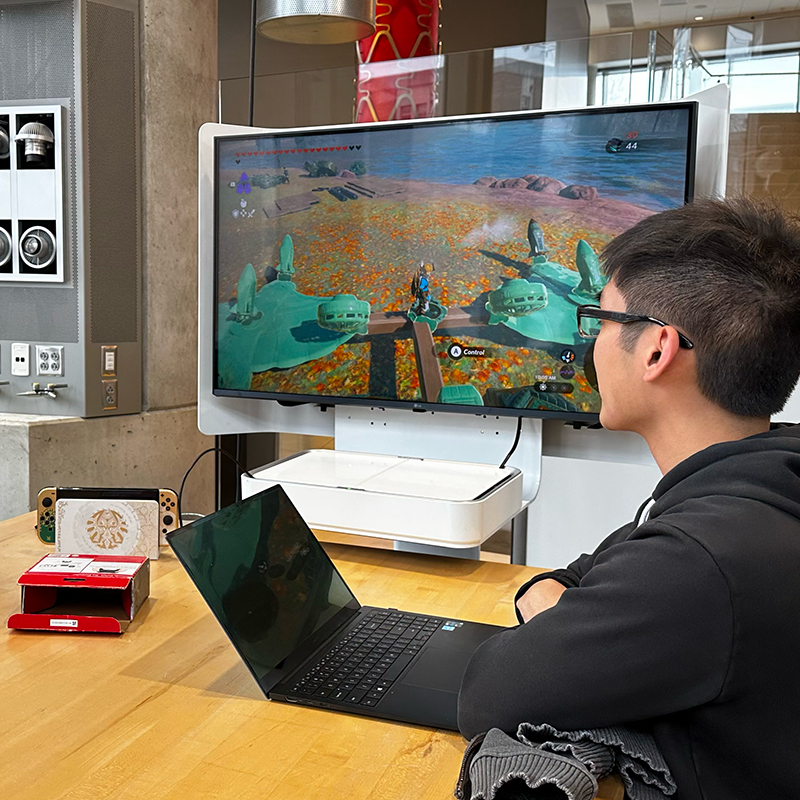News Story
Walking the Line
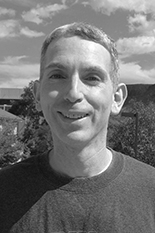
Being in the military and completing a doctoral degree can be a lonely experience. Few have done it. And other than word-of-mouth stories, there isn’t much guidance on how to deal with the competing interruptions of military duty and the demands of research.
Meet CDR Joshua Pearlman, a doctoral student in Mechanical Engineering with 26 years of Navy service between active and reserve duty. He has deployed twice during his studies – once to Iraq and a second time to Kuwait and Afghanistan. His Ph.D. is 15 years in the making – a keen interest in fuel cell systems research paired with a call to serve his country.
Despite the challenges, Pearlman has been able to marry his two longstanding passions. And over time, each training informed the other – even if at first glance doctoral work bears little resemblance to military operations. Both occupations require sleepless nights, discipline, and persistence. Whether in a military or academic environment, it helps to be resourceful, collaborative, and people-oriented.
But this is perhaps where the common ground ends. For Pearlman, entering the Navy’s ROTC program in college was a vocation. There was something tugging at his core. “For me, it was important to contribute to something beyond my own personal benefit, and to be involved in society in some way. I never grew up feeling I was in it for myself, or how far ahead I could get without regard for how it affected other people,” he recalls. Pearlman’s decision was made intentionally and alone – even though his family has had a strong tradition of public service.
After finishing his undergraduate degree in mechanical engineering at the University of Rochester in 1992, Pearlman ended up in the Civil Engineer Corps (CEC). This community of Naval officers, comprised of experts from a number of engineering fields and related disciplines, is typically responsible for the oversight, operation, construction, and maintenance of Navy shore facilities, including work in contingency environments. After initial training, Pearlman had his first assignment in Bahrain. The CEC would eventually take Pearlman to other places – Newport, Rhode Island; Okinawa, Japan; Roosevelt Roads, Puerto Rico; Great Inagua island in The Bahamas; and eventually Iraq, then Kuwait and Afghanistan.
While in Newport, Pearlman’s detailer (the individual responsible for deciding his military assignments) wanted to send the young officer to graduate school. Within the CEC, it is standard practice, at a specific point in an officer’s career trajectory, to obtain a master’s degree for the purpose of filling specific billets (positions) for which a graduate degree is requisite experience. “As a result of this order, I ended up at UMD. I was allowed 12 months to complete my degree. My primary responsibility was school, while the administrative military requirements were kept to a minimum. During the program, a research faculty member I was working with asked if I had thought about returning for Ph.D. studies. I started thinking that at some suitable point, I would be interested in returning. When I mentioned this to Dr. Michael Ohadi, whose research group I was working with, he was very supportive of the idea. We continued to keep in contact after I rotated to my next military assignment, and he now serves as one of my committee co-chairs, along with Dr. Greg Jackson,” says Pearlman.
Upon graduation, Pearlman’s next assignment was to Naval Mobile Construction Battalion SEVENTY-FOUR (NMCB 74), a deployable construction battalion (now decommissioned) that was based in Gulfport, Mississippi. Toward the end of his assignment with NMCB 74, Pearlman became the Officer in Charge of a small detachment that was sent to construct two buildings on the remote Bahamian island of Great Inagua. While there, the 9/11 terrorist attacks occurred, and with it, the start of the resulting shift to wartime efforts. Among the coral sands, GP Medium tents, and isolation of the deployment site, Pearlman saw the World Trade Center towers enveloped in smoke over a satellite news feed. Even knowing that there was a potential for attacks, and understanding that the U.S. was insulated from a good part of the terrorist violence going on in the rest of the world, for Pearlman, it was staggering to see an attack of this magnitude. He watched the live news feed as the South Tower collapsed. “I was stunned. It was hard to believe what I was seeing,” recalls Pearlman.
From NMCB 74, Pearlman went to Camp Lejeune, North Carolina to serve as the Naval Construction Force Liaison Officer (NCF LNO) to the U.S. Marine Corps’ II Marine Expeditionary Force (II MEF). In this capacity, he served as a coordination point between II MEF and NCF units, both on exercise- and project-related tasking. At the time, however, Pearlman had not picked up a required promotion, and was faced with having to transition off active duty. While one door partially closed, another opened to graduate school. Pearlman entered UMD as a doctoral student in January 2003 while he was still on terminal leave from active duty. He was off active duty for less than a year when he was recalled, and subsequently deployed to Iraq, where he was selected for promotion.
In Iraq, Pearlman was part of a small Navy detachment that worked closely with deployed Marine Corps forces to administer construction projects in support of the civil affairs efforts of I Marine Expeditionary Force (I MEF) and its subordinate units. This work took Pearlman to Anbar Province for most of his deployment--first in Ramadi, and then at Camp Fallujah and a small nearby military compound. During his last month of deployment, he supported initial planning for a few projects in central Iraq. “Our purpose was to try to improve security and develop mutual trust with local communities. We hoped to improve life for Iraqi communities in some way, and beyond that, to foster lines of communication,” recalls Pearlman. He and many others like him, helped to fulfill the military’s civil affairs mission in Iraq through projects that improved infrastructure, medical care, and facilities in concert with local governments, and businesses.
Pearlman wasn’t sent to Iraq to fight insurgents. He was sent over as an engineer with a background in facilities contracts administration. And he doesn’t characterize his deployment as anything resembling the worst experiences that other personnel faced. He was not injured, and he did not personally witness anyone being killed or seriously harmed. Still, being in a war zone had its effects. “Certainly there were mortar attacks when I was there. In Ramadi, they occurred about every 4 or 5 days, and less frequently elsewhere,” says Pearlman.
In one situation, Pearlman visited a housing project site near Fallujah when the location came under attack. Several mortar rounds landed, and exploded in a vacant area across the road from where they were. When the team departed for base, the convoy was ambushed with an explosive device. Fortunately, no one was injured. In another incident, a series of mortar rounds, launched from Fallujah City, were overflying Pearlman’s small compound adjacent to base. Pearlman sought shelter under a heavy wooden table and continued to work on his laptop.
Still, Pearlman was always more concerned about the possibility of an improvised explosive device (IED) strike. “There were times when I knew I was slated to go on the road for a project survey, and remember lying on my cot at night, wondering if in a couple of days, I was still going to have both my feet attached. I didn’t know if I would. And even if someone stayed in the confines of a camp the entire time, they could still fall to a mortar strike,” recalls Pearlman. These experiences, coupled with the death of people he previously encountered, left a mark on Pearlman.
The constant state of tension was hard to shake, especially after returning to the States almost seven months later. Then, back to the parallel universe of graduate research. Pearlman was what military and veteran publications call in transition. Even in absence of overt trauma, coming back from long and stressful workdays, a different climate, sustained sleep deprivation, and austere, intense living conditions can impact one’s ability to readjust to daily life.
“After I came back from Iraq, I don’t know for exactly how long, but probably for about a month or two, I had some dreams that I was in another mortar strike. The mortars would come in and go off, as they did while I was deployed. For me, those dreams went away fairly quickly. What persisted was this sense of urgency. It was hard to let go of that. And I didn’t just come back from Iraq and go to school, but I also returned to reserve duty, which can be very demanding in its own right. Since 9/11, the time commitment has been different,” says Pearlman. “The mental challenge of focusing fully on academics was also very difficult largely because the sense of urgency was still directed at the military. It was hard to let go of the notion that I should be thinking about my military responsibilities. Iraq exacerbated that feeling because 24 hours a day I was in an environment where you had to be very channeled into the operational mission,” he adds.
Soldiers can't just go, deploy, and come home as if nothing has changed. Coupled with the ongoing interruptions in his research and personal struggles, Pearlman had to contend with time ticking by – and knowledge evolving in his discipline, changes in his research, and playing constant catch-up. “I went through some extended, difficult stretches at school after Iraq. One of my committee members, in particular, was extremely supportive when I had to redo my proposal. She made it very clear that she felt I had substantial ability, and was fully capable of seeing my program through, but she made it equally clear that I really needed to seek help with some of the focus issues. I took her advice and did that. At that time, reserve duty was also really demanding, and I had to step back from that so that I could satisfactorily complete my proposal,” remembers Pearlman.
Pearlman’s second deployment was in 2010, when he had just advanced to candidacy. His time was roughly divided between Kuwait, Kandahar Airfield (KAF), Afghanistan, and short visits to other locations. This time deployment was different. He stayed on the KAF compound for the duration of his deployment. “In Iraq, when we went out on the road, there was a chance of being hit with an IED. There, you knew you were in a mortar attack when you heard the rounds detonating. In Afghanistan, there were still alerts when something was going to happen, but for me, it was a less intense environment.” The same was not true for those whose duties took them off base. “There were challenges for me, but it was a different experience,” says Pearlman. Still, “the pace was fast, and once again, that was something that I had to learn to transition out of,” he adds.
Coming back from his second deployment, Pearlman, once again, had to reclaim his life, and his graduate studies. “It wasn't an overnight transition. I came back and worked on my project while trying to juggle significant tasks on the reserve side. It got to a point where I realized outright that I needed to say ‘no’ to some things. So for the last few years, I have specifically requested not to be assigned to a paid reserve billet while I am working to finish school. I still perform reserve duty each month (which is creditable towards my retirement), and I fulfill the commitments that come with it, but it is much less time-intensive than in a paid assignment. When I got back from Afghanistan, there were times when I was putting in 30 plus hours per week in Navy reserve commitments. For many who are in the military, it is not just an occupation, it is a higher calling to serve, and it can be harder to say ‘no’ than in some other careers,” observes Pearlman. He adds, “It is still very important to me, but as I am approaching the conclusion of my Navy career, what I can contribute the most going forward is defined by my ability to finish school. It took a while to be able to say ‘no’ to some things, but now I am more comfortable with it.”
Pearlman's Commanding Officer after Afghanistan, CAPT Dan Haubner, echoes these observations. After coming home, their unit was trying to expedite active duty releases for 500 military personnel – a very time consuming and painstaking process. “I am not exaggerating when I tell you that I would swing by the office after dinner, find Josh and a couple of his people still hunched over the keyboards with stacks of paper everywhere at 9:00 or 10:00 P.M, and I would literally have to order him to go and get some sleep. This went on for more months than I can count. Even during our weeks between our military weekends, Josh would call me and email me throughout the evenings to keep me apprised of their progress on closing out these actions. Trying to manage a battalion of 500 personnel is not a part-time job, even in the Reserves. Couple that with Josh's Ph.D. work, I think you can see the level of effort he had to put in during these two years [after deployment]. There were multiple conversations about long-term career goals related to completing his Ph.D., and his desire to serve his country. We would often re-prioritize things to keep him on track with his Ph.D. as much as we could,” says Haubner.
Former Commanding Officer, Ret. CAPT Dr. Ben Boccuzzi, was also in Pearlman’s corner. He understood, first hand, the difficulties of the military-academic balancing act, and over their four-year association, shared his challenges with his colleague. “For the most part, you would never have known that Josh was in a Ph.D. program if he didn’t tell you. We would miss him from time to time when he needed to be out of state, but all of his work was completed, and passed on to representatives so that the Unit always had accurate and up-to-the-minute data. What is most important to convey, is that Josh has been three times the citizen. Reservists are often referred to as ‘twice the citizen’ – full-time military and full-time civilian. Josh took that to the next level. He was a superb senior officer – capable of leading a group, and maintaining accurate and timely results. The challenges do not get easier as you progress, you just get used to them. Josh almost made the challenges look easy, but I knew how much he was paddling underwater to keep our unit, his dissertation, and his life all moving in positive directions,” recalls Boccuzzi.
Pearlman doesn't deny he was stretched very thin. In fact, he admits to learning some wisdom: having a support system, asking for help, the ability to say ‘no’, time for yourself, and getting enough sleep. “Even with good habits, doing anything difficult is still going to involve discomfort. Whether military duty or graduate study, each in its own way is stressful and requires hard work. Realizing that discomfort is a normal reaction to those stresses, and learning to handle them more constructively, have been important lessons for me. Perseverance requires working through periods that can be very uncomfortable, but having a good support network and healthy outlets mean not having to face those stretches alone,” adds Pearlman.
Graduate programs and institutions can also play a critical role in the academic experience of military graduate students. In Pearlman’s case, departmental support from Mechanical Engineering and the University’s services have been crucial. “Institutions can help by effectively communicating what resources are available within the university community for their graduate students, and what school policies are in effect related to military duty and military members. I think it helps when institutions are aware that impacts due to active duty deployments are not always limited to the time period covered within a set of active duty orders. There are effects that can go well outside that period, including premobilization preparations, research project impacts, and having to get situated back into a normal routine after deployment. As personal examples, after my Iraq deployment, I had to change to a different research project when I returned, and there was a substantial amount of closeout work remaining after Kuwait and Afghanistan, as well. I am grateful that UMD has been supportive and attuned to that. For those of us who continue to drill as reserve members while we are in school, time commitments while in an inactive duty status can be substantial, as well,” remarks Pearlman.
"We as a program, especially Greg Jackson and Mike Ohadi, have really supported Josh. We actually work with a number of graduate students from the military, and have great respect for service to country. Such duties inevitably do come first, and we work to accommodate these needs as they emerge," says Kerri Poppler James, Associate Director for Graduate Studies, Department of Mechanical Engineering.
As is often the case, military commitments while on inactive status may actually have as much, if not more, of a time impact on academic study than the periods during which a military member is recalled to active duty and deployed. This was certainly the case for Pearlman. He cautions, however, that “military members and veterans are a diverse group, and the first step is being aware that not everyone’s needs are going to be the same. Even within the same operational theater, people are going to have very different experiences on their deployments, and they will have their own reactions to those experiences.”
This journey is not quite over for Pearlman. Even as he closes in on the Ph.D., he is still learning to ‘walk the line’ to use a slacklining expression – his favorite pursuit. And yet, his story is one of success. He has been able to assemble the support of a good team - his graduate program and the military. “I don’t know anyone with a typical path. I just found that I had a passion for what I was doing, both in my research and in the military. I’ve learned a lot about myself, not only from my two deployment experiences, but from each of my other military assignments, and from my graduate program. And I hope that sharing these experiences will help others in comparable situations,” concludes Pearlman.
Published November 1, 2018





